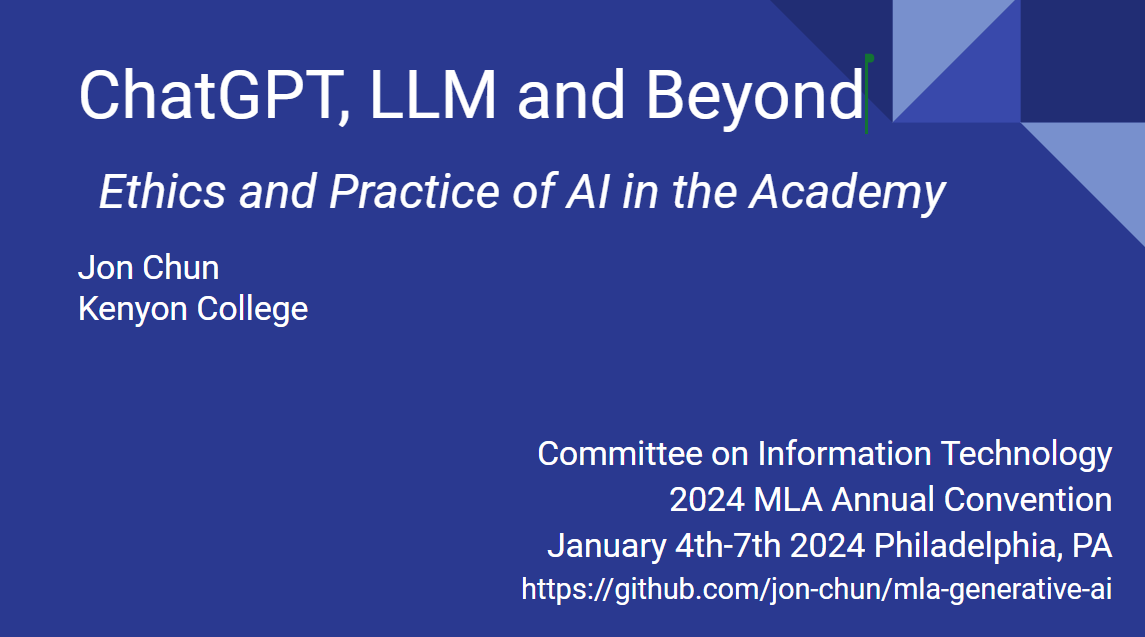- Jan 4th - 7th
- Philadelphia, PA
- 4 January 2024, 7:00 – 8:15 PM EST (Convention Program page)
- Marriott – Franklin 2
- Hashtags: #mla24, #s148
As artificial intelligences (AIs) in the form of “large language models” and similar models trained by neural networks (including but not limited to ChatGPT) become a presence in society, profound concerns arise about their ethical and practical use in the academy. This session focuses on what the professional and ethical position of higher education and associations such as the MLA is or should be given ever more capable AIs. What are practical, desired, and ethical uses of AIs by students, instructors, researchers, and administrators? Topics suggested in the original call for papers included: whether or how to make AIs part of academic work in the literature and language classroom; the stakes (and ways) of incorporating AIs in research or in such everyday academic business as writing recommendations, administrative memos, etc.; and how to grapple with the social, political, and economic implications of AIs in the academy.
As artificial intelligences (AIs) in the form of “large language models” and similar models trained by neural networks (including but not limited to ChatGPT) become a presence in society, profound concerns arise about their ethical and practical use in the academy. This session calls for presentations focusing on what the professional and ethical position of higher education and associations such as the MLA is or should be given ever more capable AIs. What are practical, desired, and ethical uses of AIs by students, instructors, researchers, and administrators? Presentation topics could include whether or how to make AIs part of academic work in the literature and language classroom; the stakes (and ways) of incorporating AIs in research or in such everyday academic business as writing recommendations, administrative memos, etc.; and how to grapple with the social, political, and economic implications of AIs in the academy.
My presentation aims to provide clarifying mental models and give a concise overview of the sometimes confusing end-to-end implementation/use of ChatGPT/LLMs.
I hope my presentation can overcome some common misperceptions and spark both curiosity and better-grounded critiques of AI LLMs in research and pedagogy.
My proposed presentation on ChatGPT is an extension of several I have given including the Narrative2022/2023 conferences as well as three since January 2023 at Kenyon College (for the community, admissions and communications). I have been particularly vested in strategizing around the disruptions AI models like ChatGPT are creating. I have been deeply involved in interdisciplinary AI as co-founder of the first human-centric AI Digital Humanities curriculum for Kenyon’s Integrated Program for Humane Studies (since 2016). I have been publishing research on generative AI since GPT2 was first publicly released in 2019.
I’ll focus on four topics. The first topic explains how ChatGPT works, contrasting current vs inherent abilities and limitations. Second, I present a detailed exposition on the rapidly evolving art of prompt engineering. Much confusion around LLMs stem from misunderstandings around poorly documented prompting in terms of taxonomy and interaction. Third, I’ll present a theoretical mental model of how ChatGPT represents, manipulates and generates coherent language based upon linguistics, neuroscience, complexity theory and AI research. Finally, I’ll close with research trends and timelines.

